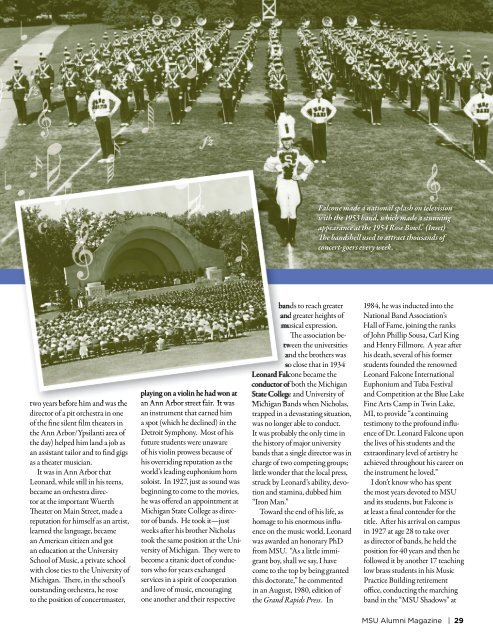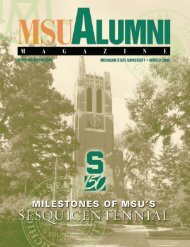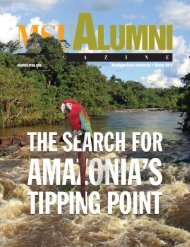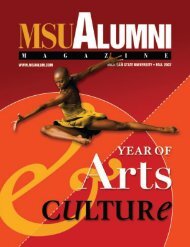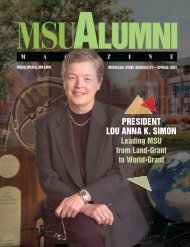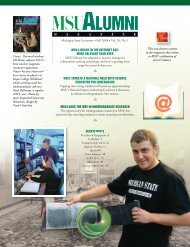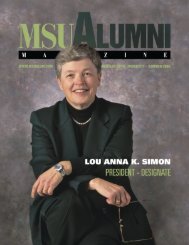Raving fans wear Spartan jewelry - MSU Alumni Association ...
Raving fans wear Spartan jewelry - MSU Alumni Association ...
Raving fans wear Spartan jewelry - MSU Alumni Association ...
Create successful ePaper yourself
Turn your PDF publications into a flip-book with our unique Google optimized e-Paper software.
Falcone made a national splash on television<br />
with the 1953 band, which made a stunning<br />
appearance at the 1954 Rose Bowl. (Inset)<br />
The bandshell used to attract thousands of<br />
concert-goers every week.<br />
two years before him and was the<br />
director of a pit orchestra in one<br />
of the fine silent film theaters in<br />
the Ann Arbor/Ypsilanti area of<br />
the day) helped him land a job as<br />
an assistant tailor and to find gigs<br />
as a theater musician.<br />
It was in Ann Arbor that<br />
Leonard, while still in his teens,<br />
became an orchestra director<br />
at the important Wuerth<br />
Theater on Main Street, made a<br />
reputation for himself as an artist,<br />
learned the language, became<br />
an American citizen and got<br />
an education at the University<br />
School of Music, a private school<br />
with close ties to the University of<br />
Michigan. There, in the school’s<br />
outstanding orchestra, he rose<br />
to the position of concertmaster,<br />
playing on a violin he had won at<br />
an Ann Arbor street fair. It was<br />
an instrument that earned him<br />
a spot (which he declined) in the<br />
Detroit Symphony. Most of his<br />
future students were unaware<br />
of his violin prowess because of<br />
his overriding reputation as the<br />
world’s leading euphonium horn<br />
soloist. In 1927, just as sound was<br />
beginning to come to the movies,<br />
he was offered an appointment at<br />
Michigan State College as director<br />
of bands. He took it—just<br />
weeks after his brother Nicholas<br />
took the same position at the University<br />
of Michigan. They were to<br />
become a titanic duet of conductors<br />
who for years exchanged<br />
services in a spirit of cooperation<br />
and love of music, encouraging<br />
one another and their respective<br />
bands to reach greater<br />
and greater heights of<br />
musical expression.<br />
The association be-<br />
tween the universities<br />
and the brothers was<br />
so close that in 1934<br />
Leonard Falcone became the<br />
conductor of both the Michigan<br />
State College and University of<br />
Michigan Bands when Nicholas,<br />
trapped in a devastating situation,<br />
was no longer able to conduct.<br />
It was probably the only time in<br />
the history of major university<br />
bands that a single director was in<br />
charge of two competing groups;<br />
little wonder that the local press,<br />
struck by Leonard’s ability, devotion<br />
and stamina, dubbed him<br />
“Iron Man.”<br />
Toward the end of his life, as<br />
homage to his enormous influence<br />
on the music world, Leonard<br />
was awarded an honorary PhD<br />
from <strong>MSU</strong>. “As a little immigrant<br />
boy, shall we say, I have<br />
come to the top by being granted<br />
this doctorate,” he commented<br />
in an August, 1980, edition of<br />
the Grand Rapids Press. In<br />
1984, he was inducted into the<br />
National Band <strong>Association</strong>’s<br />
Hall of Fame, joining the ranks<br />
of John Phillip Sousa, Carl King<br />
and Henry Fillmore. A year after<br />
his death, several of his former<br />
students founded the renowned<br />
Leonard Falcone International<br />
Euphonium and Tuba Festival<br />
and Competition at the Blue Lake<br />
Fine Arts Camp in Twin Lake,<br />
MI, to provide “a continuing<br />
testimony to the profound influence<br />
of Dr. Leonard Falcone upon<br />
the lives of his students and the<br />
extraordinary level of artistry he<br />
achieved throughout his career on<br />
the instrument he loved.”<br />
I don’t know who has spent<br />
the most years devoted to <strong>MSU</strong><br />
and its students, but Falcone is<br />
at least a final contender for the<br />
title. After his arrival on campus<br />
in 1927 at age 28 to take over<br />
as director of bands, he held the<br />
position for 40 years and then he<br />
followed it by another 17 teaching<br />
low brass students in his Music<br />
Practice Building retirement<br />
office, conducting the marching<br />
band in the “<strong>MSU</strong> Shadows” at<br />
<strong>MSU</strong> <strong>Alumni</strong> Magazine | 29


